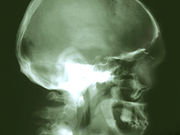Findings at six and 12 months after treatment for advanced head and neck cancer
WEDNESDAY, Jan. 4, 2017 (HealthDay News) — Patients with sustained or newly developed cancer cachexia at six and 12 months after initial treatment for advanced head and neck squamous cell carcinoma (HNSCC) are at higher risk of cancer recurrences, the onset of non-cancer health events, and poor survival outcomes, according to a study published online Dec. 21 in Head & Neck.
Minsu Kwon, M.D., from Gyeongsang National University in Changwon, South Korea, and colleagues assessed the prevalence of cancer cachexia during the first year after curative initial treatment for advanced head and neck squamous cell carcinoma in 361 patients.
The researchers found that immediately before treatment, after treatment, six months after treatment, and 12 months after treatment, cancer cachexia was identified in 6.1, 41, 18.4, and 18.7 percent of participants, respectively. At six and 12 months, sustained or newly developed cachexia was significantly associated with cancer recurrence and non-cancer health events occurrence (P < 0.05). Patients with cachexia had a higher probability of cancer-specific death, noncancerous death, and overall death (P < 0.05).
“More than half of the patients with advanced-stage HNSCC could experience cancer cachexia during the first year of follow-up after a primary therapy,” the authors write.
Full Text (subscription or payment may be required)
Copyright © 2016 HealthDay. All rights reserved.








